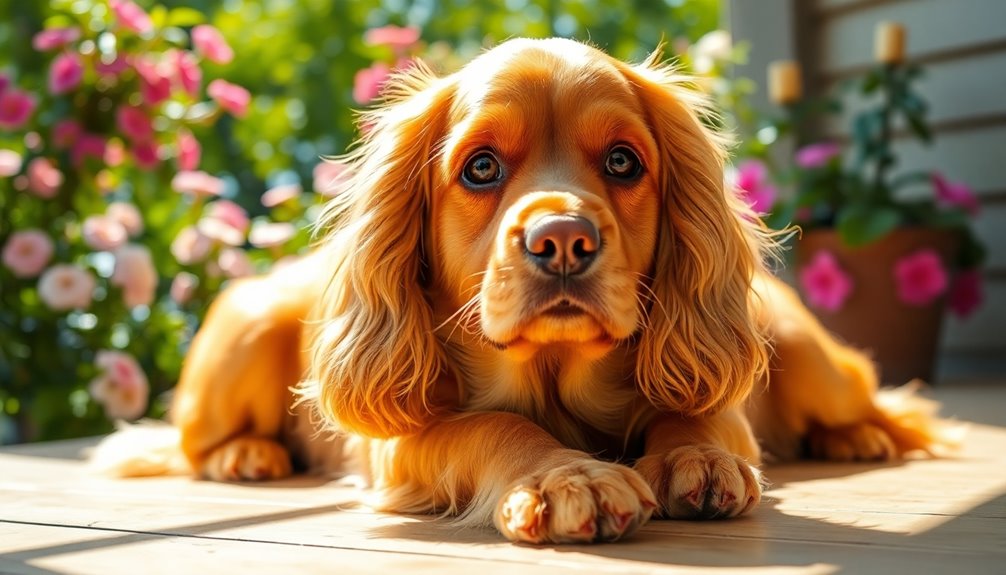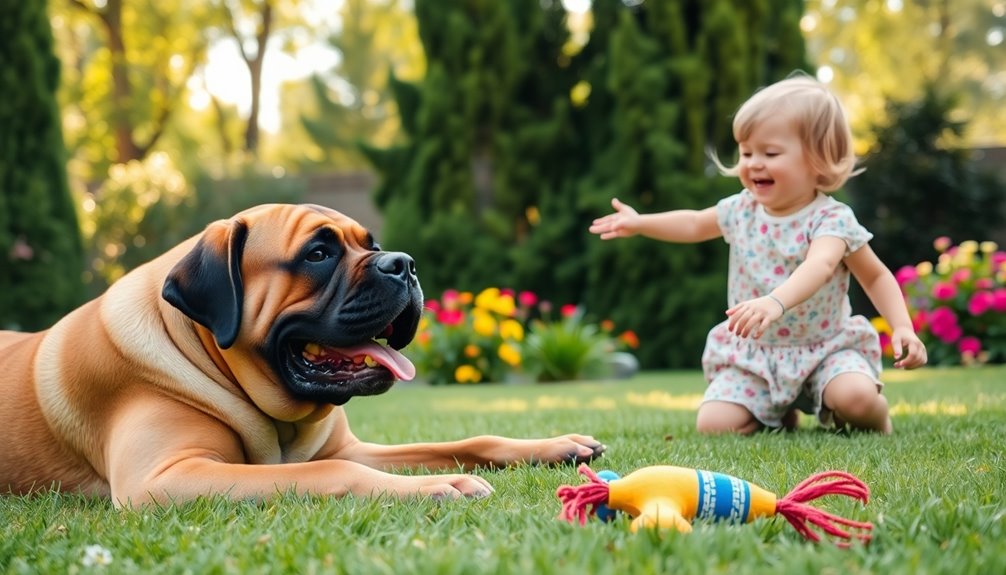The Cockalier, a charming mix of the Cavalier King Charles Spaniel and Cocker Spaniel, brings together affection and playfulness. With their soft, silky coat and loving nature, these medium-sized dogs are perfect companions for families, thriving on interaction and outdoor fun. They're smart and sociable, making training enjoyable with consistent, positive reinforcement. While they require daily exercise and regular grooming, their adaptability to various living environments is impressive. Health-conscious owners should be aware of potential issues, but with proper care, Cockaliers can live long, happy lives. Discover more about their unique traits and how they can fit into your life.
Key Takeaways
- Cockaliers combine the affectionate traits of Cavalier King Charles Spaniels and Cocker Spaniels, making them wonderfully charming companions.
- Their friendly and loving nature makes them ideal for families, especially those with children.
- With a variety of coat colors and textures, Cockaliers are visually appealing and require regular grooming to maintain their charm.
- Their sociable and intelligent demeanor thrives on human interaction, ensuring they bond deeply with their families.
- Adaptable to various living environments, they excel as therapy dogs, providing emotional support and comfort to those in need.

SleekEZ Dog Brush for Shedding & Dog Grooming Supplies | Pet Hair Removal Tool | Great For All Fur Types | For Short, Medium, & Long Hair Pets | Reduces Shedding by 95% | Made in USA | 5 inch
SAVE MONEY: Reduce expensive trips to the groomer. Our dog shedding brush works great as a dog brush…
As an affiliate, we earn on qualifying purchases.
As an affiliate, we earn on qualifying purchases.
Introduction
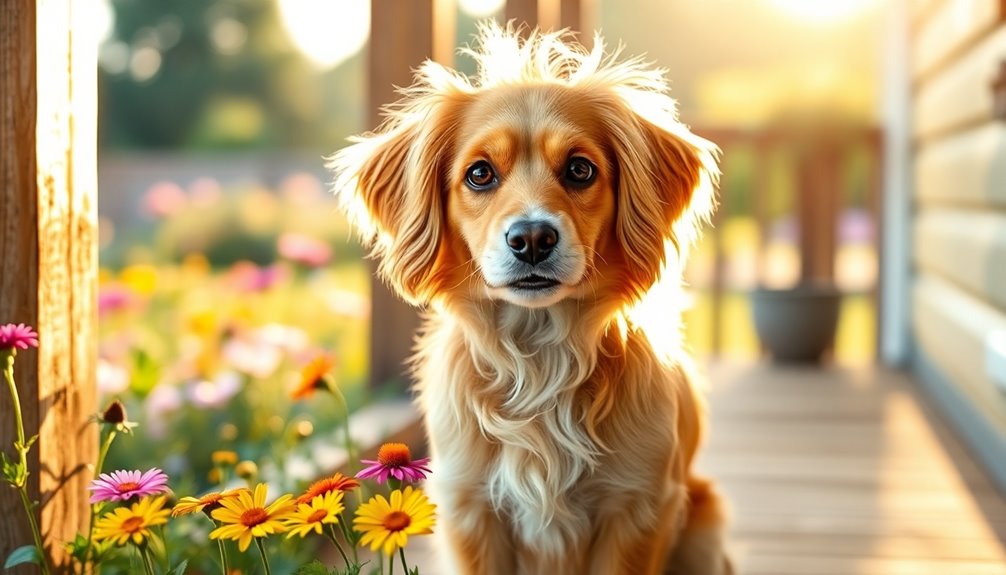
When you're looking for a loyal companion, the Cockalier stands out as a delightful choice. This medium-sized breed combines the best traits of the Cavalier King Charles Spaniel and the Cocker Spaniel, resulting in a dog that's not only adorable but also incredibly affectionate.
With a soft and silky coat that can range from straight to wavy or curly, the Cockalier's expressive brown eyes and long floppy ears add to its charm. You'll find that these dogs possess a friendly and loving nature, making them devoted family members. They're intelligent and sociable, thriving in environments where they can interact with both humans and other pets.
Their playful and energetic demeanor requires about an hour of moderate exercise daily, so be prepared for daily walks and engaging playtime. Daily exercise is crucial for keeping them happy and healthy, as it helps prevent behavioral issues and keeps their energy levels in check.
Regular grooming is essential to keep their coat free from matting, and you'll need to stay on top of their health needs, including vet check-ups and a balanced diet.
With the right care and attention, a Cockalier can be a wonderful addition to your home, offering endless affection and companionship.

lilfrd Dog Puzzle Toys – Enrichment Squeaky Crinkle Snuffle Treat Dispensing Smart Dog Toys for Boredom and Stimulating, Durable Plush Toys for Large Medium Small Breed – Turtle
Dog Enrichment Toys: 3-layer turtle shells as treat dispensing pockets, 4" diameter, larger than other snuffle toys. Holds…
As an affiliate, we earn on qualifying purchases.
As an affiliate, we earn on qualifying purchases.
History and Origin

The Cockalier originated in the United States as a blend of the Cavalier King Charles Spaniel and the Cocker Spaniel. This hybrid was specifically bred to create a friendly and affectionate companion for families. Understanding its roots helps you appreciate why this charming dog is such a beloved family pet today. The breed's high-energy nature ensures that they thrive in active households where they can receive plenty of attention and exercise.
Where and when the breed originated
Originating from a delightful mix of two beloved breeds, the Cockalier combines the charming traits of the Cavalier King Charles Spaniel and the Cocker Spaniel.
The Cavalier has its roots in the 18th century, where it was bred to warm laps in English castles and carriages. Developed from Toy Spaniels at Blenheim Palace, this breed initially had a longer nose but was later refined to feature a flatter face.
Meanwhile, the Cocker Spaniel originated in Britain during the 1800s, specifically bred as a hunting dog to flush out woodcock from dense underbrush. Both the American and English versions of the Cocker Spaniel emerged during this time, showcasing the breed's versatility and hunting prowess.
The Cockalier, a modern hybrid, arose from combining these two distinct breeds. Although it lacks formal recognition from kennel clubs, this breed reflects the affectionate and loyal nature of its parents. Additionally, the Cockalier's small bladder size necessitates frequent bathroom breaks, making it essential for owners to provide ample opportunities for their pets to relieve themselves.
The Cockalier's formation is a testament to contemporary breeding practices, allowing it to inherit an array of traits and characteristics. As a result, the Cockalier embodies the rich heritage of spaniels while adapting to the needs of today's pet owners.
Companion and Family Pet
As a companion and family pet, the Cockalier thrives on its affectionate nature and deep loyalty, making it an ideal addition to any household. This breed is known for being friendly and gentle, which is perfect for families with children. Their calm demeanor allows them to handle the excitement of little ones, but it's important to teach kids how to interact respectfully with them. Adult supervision during playtime ensures everyone stays safe and happy. Teaching children about self-regulation helps them develop appropriate interactions with their pets.
Cockaliers adapt effortlessly to different living environments, whether you live in a cozy apartment or a spacious home. They're highly social and get along well with other pets, making them a great fit for multi-pet households. Regular grooming is essential to maintain their beautiful coat, and they enjoy moderate exercise to keep them stimulated. Additionally, their average lifespan of 12-15 years means they can be long-term companions for your family.
With their intelligence and eagerness to please, Cockaliers are easy to train. Early socialization helps prevent behavioral issues, ensuring a well-adjusted pet. Their intuitive nature also makes them excellent emotional support animals.

HoAoOo Pet Training Clicker with Wrist Strap – Dog Training Clickers (New Black + Blue)
Come in 2 pack button clickers with wrist strap in 2 different colors:Black, blue
As an affiliate, we earn on qualifying purchases.
As an affiliate, we earn on qualifying purchases.
Physical Characteristics
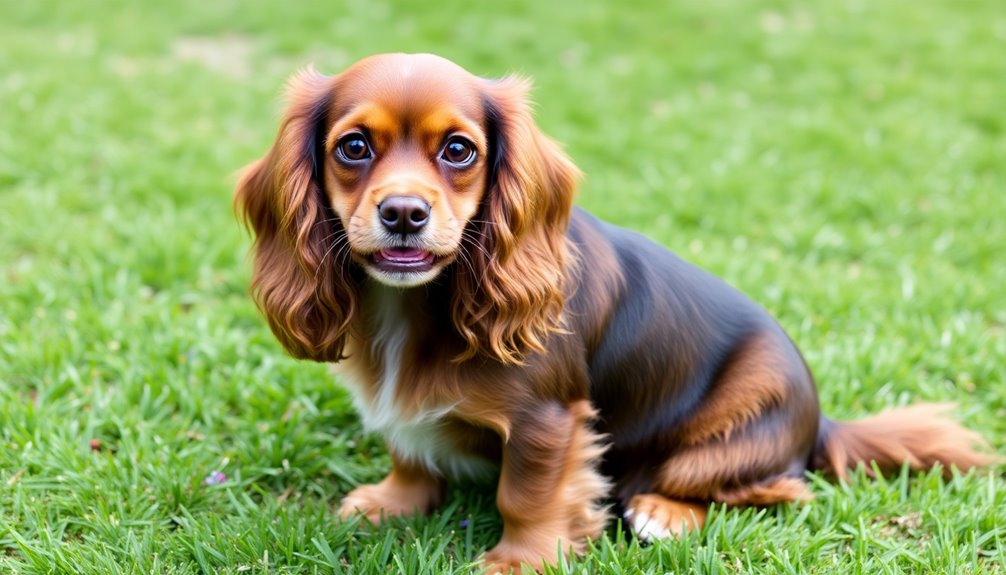
When you look at a Cockalier, you'll notice their medium-sized, athletic build that strikes a perfect balance between strength and grace. Their soft, silky coat varies in length and color, giving each dog a unique flair that requires regular grooming. With expressive brown eyes and floppy ears, these pups radiate warmth and affection, making them irresistible companions. Additionally, their friendly and gentle nature makes them ideal for families and first-time dog owners, enhancing their appeal as a beloved pet. Regular grooming not only maintains their appearance but also contributes to overall health, ensuring they stay happy and vibrant.
Size, weight, and coat details
The Cockalier is a compact and charming breed, standing between 12 to 15 inches tall and weighing between 10 to 28 pounds. This size makes them suitable for apartment living, yet they're sturdy enough for outdoor adventures. It's important to note that their lifespan averages 12 to 15 years with proper care, showcasing their resilience and potential as a long-term companion.
Keep in mind that their weight can vary significantly due to mixed breeding, so monitoring their calorie intake is essential to prevent weight gain.
When it comes to their coat, the Cockalier inherits a silky texture from the Cavalier King Charles Spaniel and a wavy quality from the Cocker Spaniel.
You'll find their coat in a mix of colors, including black, tan, red, and white, often in charming combinations. The long, flowing hair adds to their appeal but requires regular grooming to maintain its health.
Moderate shedding means you'll need to brush their coat consistently to keep it looking its best.
Floppy, Expressive Ears
Floppy, expressive ears are a defining feature of the Cockalier, often capturing the hearts of those who meet them. These long, floppy ears, characteristic of both the Cocker Spaniel and Cavalier King Charles Spaniel parent breeds, are typically covered in soft, wavy hair. Their charming appearance enhances the Cockalier's sweet and gentle look, making them irresistibly cuddly companions.
However, these delightful ears can also pose some health challenges. The ear structure can decrease airflow, creating a humid environment that may lead to ear infections. Floppy ear structure and hairy ear canals contribute to moisture retention, increasing the risk of complications. You'll want to keep an eye out for symptoms like itchiness, head shaking, redness, or an unpleasant smell, as these may indicate an infection.
To prevent issues, regular ear cleaning and monitoring are essential. Annual veterinary check-ups and prompt treatment for any signs of infection can help maintain your Cockalier's ear health.

JOLLYVOGUE Dog & Cat Bed, Calming Anti-Anxiety Pet Bed for Small Dogs, Fluffy Donut Cushion for Small and Medium Pets (20")
SIZE CHOICE: Calming donut fluffy plush faux fur dog beds are a must have for every pet owner…
As an affiliate, we earn on qualifying purchases.
As an affiliate, we earn on qualifying purchases.
Temperament and Personality
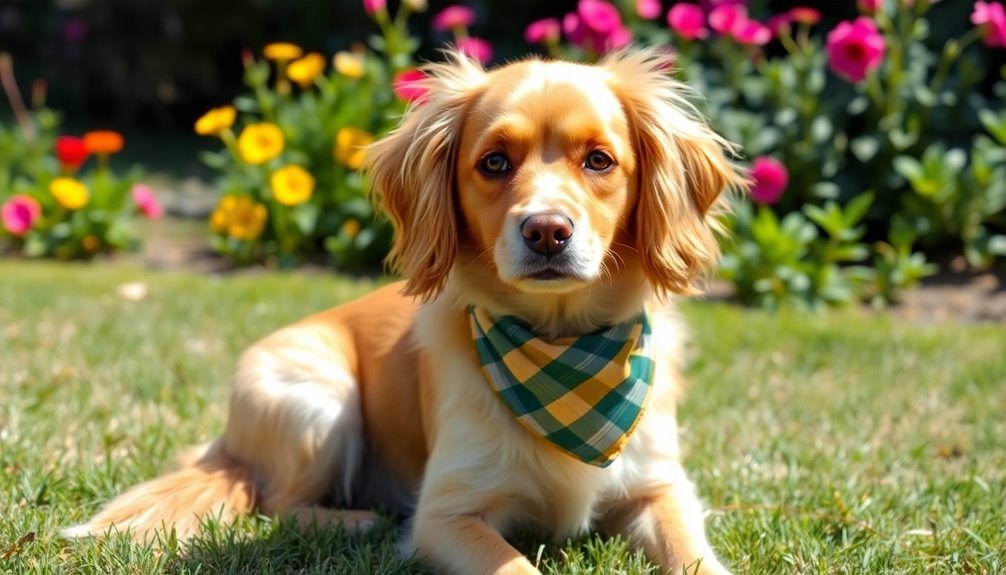
When you bring a Cockalier into your home, you'll quickly notice their playful and social demeanor.
They fit perfectly into family life, thriving alongside children and other pets with the right socialization.
Their affectionate nature makes them not just companions but also loyal friends who adapt well to various living situations.
Playful and Social Demeanor
Cockaliers embody a delightful combination of playful energy and social charisma, making them a joy to be around. These affectionate pups thrive on human interaction and love to engage in family activities. Their sweet and cheerful temperament means they're always ready for a game of fetch or a spirited round of tug of war, ensuring that playtime is never dull. To keep their spirits high, providing engaging activities can also stimulate cognitive function and prevent boredom.
Daily physical activity and mental stimulation are essential for keeping your Cockalier happy and healthy. If you neglect their need for interaction, they might become bored or restless. Regular visits to dog parks or short outings provide opportunities for socialization, allowing them to meet new people and other animals. Incorporating consistent training into their routine helps reinforce positive behavior and enhances their social skills.
Cockaliers respond exceptionally well to positive reinforcement, making training a breeze. Their eagerness to please means they can quickly learn commands and tricks, especially when rewarded with treats. Consistent training with clear expectations is crucial, helping them master not just obedience but also social behavior. Additionally, maintaining a calm demeanor during training sessions can model appropriate behavior and foster a positive learning environment.
With their playful demeanor and sociable nature, Cockaliers are sure to bring joy and companionship to your life. Their loyalty and affection make every moment spent together a cherished memory.
Suitability for families, individuals, or other pets
How well do Cockaliers fit into your lifestyle? These delightful dogs are incredibly adaptable, thriving in both small apartments and large homes. Their affectionate nature ensures they form strong bonds with you and your family.
If you have young children, you'll appreciate their gentle demeanor and patience; Cockaliers are excellent companions for kids. Their loyalty is unwavering, making them a cherished part of any family.
For individuals, Cockaliers provide companionship and emotional support. They're low maintenance and can flourish in smaller living spaces, provided they get regular exercise and playtime. Their friendly disposition means they'll fit seamlessly into various lifestyles.
When it comes to other pets, early socialization is key. With proper training, Cockaliers generally get along well with dogs and cats, though they may exhibit a prey drive. This means they could chase smaller animals, so keep that in mind.
A fenced-in yard is advisable for their safety. Overall, whether you're a family, an individual, or a multi-pet household, Cockaliers bring joy and affection that enriches your life.
Health and Lifespan
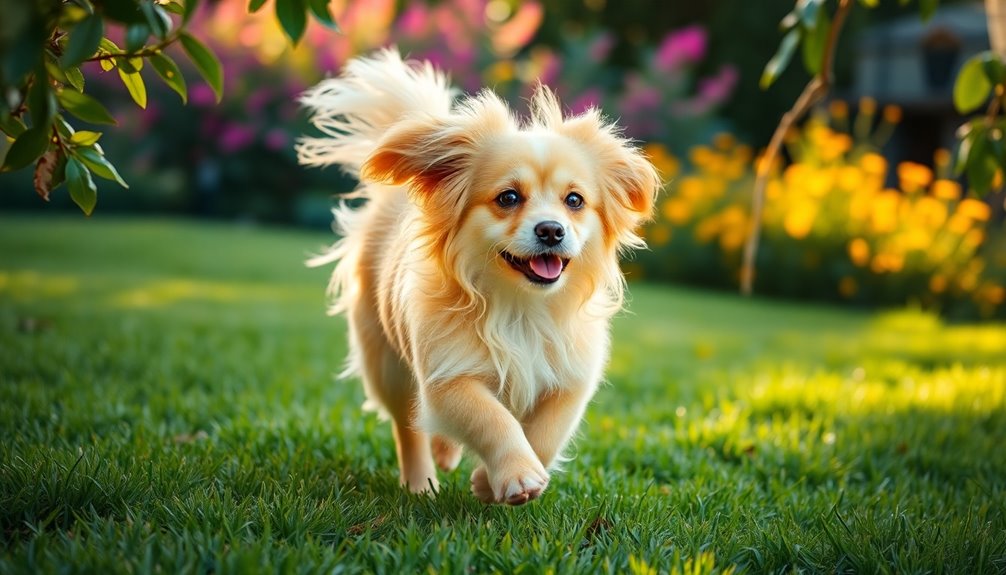
When it comes to your Cockalier's health, the average lifespan ranges from 12 to 15 years, but that can vary based on genetics and care. You'll want to be aware of common health issues like ear infections and heart problems, which can affect this breed. Regular health monitoring can contribute to their longevity and overall well-being.
Typical lifespan of the breed
The typical lifespan of a Cockalier ranges from 12 to 15 years, making them a relatively long-lived breed for their size. However, this lifespan can vary based on genetics and overall healthcare.
To help your Cockalier live a longer life, focus on providing proper care, including a balanced diet and regular exercise. These factors significantly influence their longevity.
Genetics plays a crucial role in determining lifespan, so understanding your Cockalier's parentage can give you insights into potential health issues. Maintaining a healthy weight is essential, as obesity can lead to various health problems.
Regular veterinary check-ups are vital for early detection and management of any health concerns. Additionally, regular exercise keeps your Cockalier physically and mentally stimulated, which is important for their moderate energy levels.
Don't forget about grooming; consistent brushing and bathing contribute to their overall health. A well-balanced diet rich in high-quality protein and essential nutrients is key.
Lastly, prioritize dental care, as good oral hygiene is critical for their well-being. By creating a loving and nurturing environment, you'll help ensure your Cockalier enjoys a happy, healthy life.
Common health concerns or genetic predispositions
While ensuring your Cockalier lives a long and healthy life is important, being aware of common health concerns and genetic predispositions can help you take proactive steps for their well-being.
Cockaliers are prone to several issues inherited from their parent breeds. Ear infections often arise due to their floppy ears, while eye problems such as cataracts, retinal dysplasia, and dry eye are also common. In fact, certain disorders like retinal dysplasia significantly impact the Cocker Spaniel side of their lineage.
Joint health is a significant concern, with conditions like hip dysplasia and luxating patella affecting mobility. From the Cocker Spaniel side, be alert for ectropion and entropion, which cause eyelid issues.
Cavalier King Charles Spaniels may pass on more severe conditions, including syringomyelia and myxomatous mitral valve disease.
Additionally, conditions like canine glaucoma require immediate treatment to prevent blindness, while progressive retinal atrophy leads to gradual sight loss.
Regular vet check-ups are crucial for early detection of these issues, allowing you to address problems as they arise.
Staying informed about these common health concerns will help you provide the best care for your Cockalier, ensuring they remain a happy and loving companion in your life.
Tips for maintaining health and wellness
Maintaining your Cockalier's health and wellness is essential for ensuring a long and happy life. Start with regular veterinary check-ups; annual visits help catch potential health issues early. Ensure your puppy gets vaccinations starting at 6-8 weeks, following the vet's recommended schedule. Regular vet check-ups not only help in early detection of health problems but also allow for important discussions about vaccination updates and preventive care. Additionally, providing a diet rich in antioxidants can support your dog's immune system.
A balanced diet is crucial. Feed high-quality proteins from lean meats, healthy fats like fish oil for coat health, and complex carbohydrates for energy. Aim for two meals a day, spaced about 12 hours apart, to keep their metabolism steady.
Don't forget regular exercise! Aim for 1 to 1.5 hours daily, broken into two or three sessions. Activities like fetching, swimming, or agility training keep your Cockalier engaged and healthy. Adjust the intensity based on their age and energy level. Regular exercise can also help prevent obesity, which is linked to various health issues.
Grooming and hygiene are just as important. Brush your Cockalier daily to maintain their soft coat and bathe them every four to five weeks. Clean their ears weekly with a vet-approved solution to prevent infections, and brush their teeth 2-3 times a week to avoid dental issues.
Following these tips will help ensure your Cockalier enjoys a vibrant and healthy life.
Care Requirements
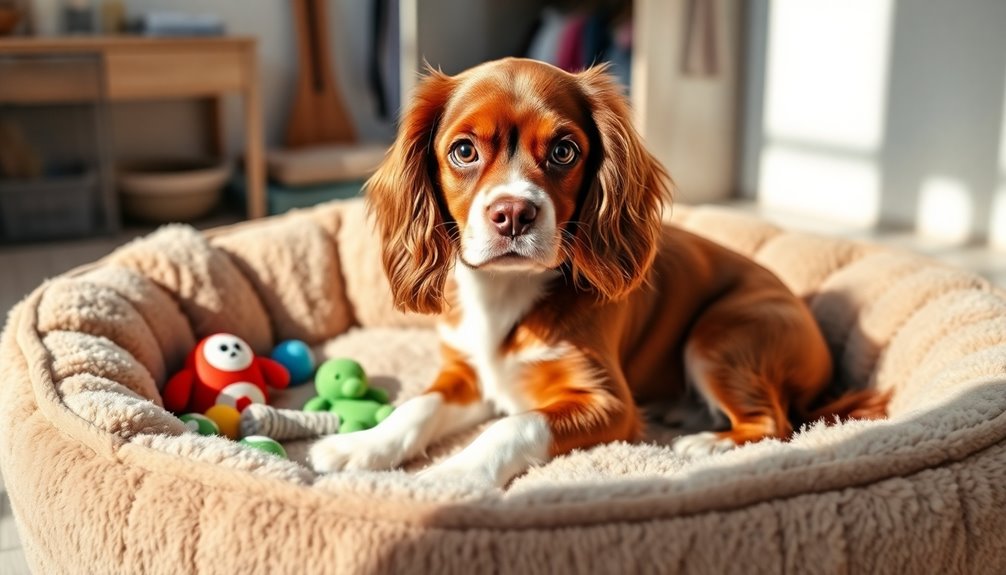
Caring for a Cockalier means meeting their needs for regular brushing, daily exercise, and a balanced diet. You'll want to brush their coat several times a week to keep it tangle-free and maintain their energy levels with at least 30 minutes of activity each day. Additionally, providing high-quality food and proper portion control will help keep your furry friend healthy and happy. To enhance your Cockalier's well-being, consider how audience engagement in their activities can positively impact their mood and behavior.
Regular Brushing Required
To keep your Cockalier looking and feeling its best, regular brushing is essential. You should brush your dog's coat several times a week, but daily brushing is recommended, especially if your Cockalier has inherited its coat from the Cocker Spaniel parent. This regular grooming helps manage shedding and keeps the coat in great condition. Regular grooming promotes overall well-being, which is crucial for your dog's happiness and health.
Incorporating brushing into your daily routine is vital for maintaining your dog's overall health and well-being.
Depending on the coat type, your Cockalier's grooming needs may vary. Cocker Spaniel coats typically require more frequent grooming due to their longer, more prone-to-matting hair, while Cavalier King Charles Spaniel coats may require less frequent maintenance yet still need regular care.
Besides brushing, remember to trim the nails every few weeks, clean the ears regularly to prevent infections, and brush the teeth daily for optimal oral health. You should also trim the hair on the pads of the feet to avoid matting.
Scheduling professional grooming every 4-6 weeks will further ensure your Cockalier's coat remains healthy and free from tangles. Consistency in grooming is key!
Exercise requirements and energy levels
Energy is vital for your Cockalier's happiness and health, so it's important to meet their exercise requirements. Aim for at least 30 minutes to an hour of exercise daily. Depending on their parent breed influence, they may need moderate to high activity levels.
Daily walks are essential, ideally 2-3 times a day, to keep them physically fit and mentally stimulated. Engage in backyard play where they can run or fetch, especially if you have a securely fenced area to accommodate their prey drive. Activities like swimming or tug-of-war are great options too.
On-leash walks allow you to bond while satisfying their exercise needs. Don't forget the mental aspect; Cockaliers thrive on mental stimulation. Incorporate obedience and agility training, use food puzzles, or engage them in scenting trials to keep boredom at bay. Regular exercise also helps prevent the development of separation anxiety, which is common in Cockaliers.
Games like hide and seek with treats can also be fun and rewarding for them. Always exercise during cooler times of the day to prevent overheating, and be consistent with their routine. Adjust their activity level based on their mood and energy, and vary routes and activities to keep things interesting.
Feeding tips and diet recommendations
Feeding your Cockalier the right diet is just as important as providing ample exercise. Focus on a balanced diet rich in high-quality protein from animal sources like beef, chicken, and fish. Incorporate healthy fats and ensure they get essential vitamins and minerals from both meat and plant sources.
Adding fiber from vegetables and berries will support their digestive health. Avoid kibble that can strain their digestive system. Instead, opt for a nutrient-dense diet that includes ground bones and offal, which acts as a natural multivitamin. Small amounts of carbohydrates from plants can provide necessary fiber and antioxidants. A species-appropriate diet ensures that your Cockalier thrives and maintains optimal health.
Keep an eye on their weight to prevent obesity-related health issues. Tailor their diet based on their size, activity level, and age. Regular weight checks will help maintain their health.
When considering supplements, choose natural, whole food options without chemicals. If you're exploring raw diets, ensure they replicate your Cockalier's natural eating habits.
Always select dog food with taurine for heart health and vitamin A for vision support. Avoid grain-free kibble high in starchy carbs and use a food calculator to determine the right portions.
Training and Socialization
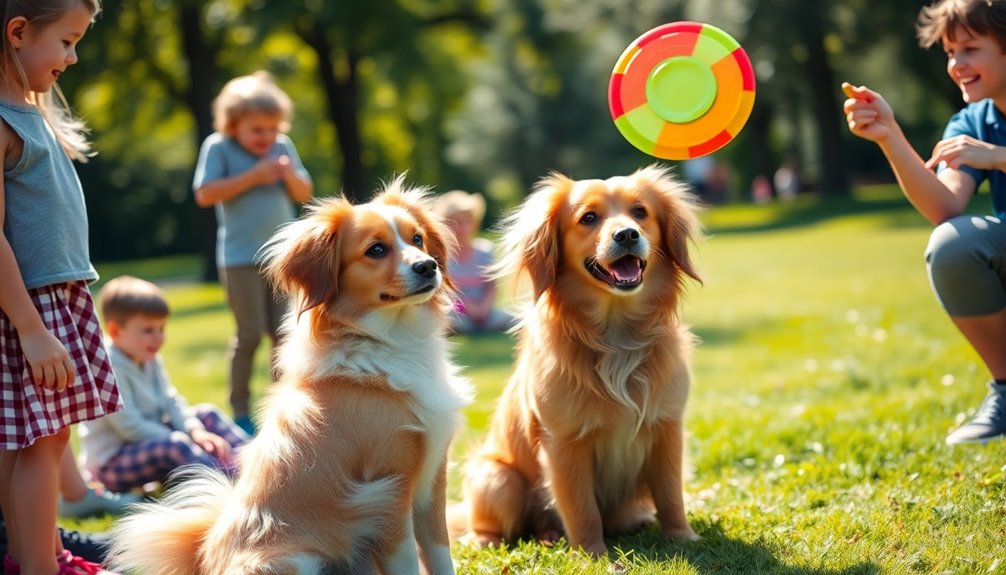
When training your Cockalier, you'll find they're moderately responsive to commands, so consistency is key. Start with gradual exposure techniques to help them adapt to new environments and experiences. Additionally, establishing a daily routine can aid in potty training as it helps to understand potty breaks and contributes to predictable potty times. Be mindful of their tendencies toward separation anxiety, as this can impact their training and socialization process.
Moderately Responsive to Commands
Many owners find that Cockaliers are moderately responsive to commands, making training an essential part of their development. To establish yourself as the pack leader, use firm and consistent commands. Start with basic obedience commands like "sit," "down," "stay," "come," and "leave it." Early training, around 8-14 weeks old, sets the foundation for good behavior.
Positive reinforcement is key for motivating your Cockalier. Use treats, praise, and play as rewards for good behavior. Food motivation works particularly well with this breed, so consider incorporating clicker training to create positive associations. Remember, immediate rewards are crucial for reinforcing desired behaviors. Additionally, early socialization is essential for preventing lasting behavioral issues, so prioritize exposing your Cockalier to various stimuli.
Socialization is just as important. Introduce your Cockalier to new people and animals in a controlled environment, rewarding good behavior during these interactions. Gradually expose them to public places like dog parks, ensuring that these experiences are brief and positive to prevent over-stimulation.
Finally, be patient and persistent. Address any behavioral issues with consistent training and mental stimulation. If problems persist, don't hesitate to consult a professional for guidance. With care and dedication, your Cockalier can become a well-behaved companion.
Introduce Gradual Exposure Techniques
To ensure your Cockalier thrives in various environments, introducing gradual exposure techniques is vital. Start by identifying any fears your dog may have and gradually expose them to these stimuli at a low intensity.
Begin with a level your Cockalier can handle without showing signs of stress. As your dog becomes more comfortable, slowly increase the exposure in intensity or duration. Remember to reward calm behavior during these sessions to reinforce positive responses. Positive reinforcement is key to enhancing your dog's learning and building a trusting relationship during this process.
Incorporate counter-conditioning methods by pairing the feared stimulus with treats or play. This helps change your dog's emotional response from fear to joy. Always ensure your Cockalier remains calm and comfortable before gradually increasing exposure to the feared stimulus while maintaining positive associations.
Socialization is also crucial. Introduce your dog to new people and animals in a controlled environment, rewarding good behavior to boost their confidence.
As they adjust, gradually increase exposure to more public places such as dog parks. Use consistent positive reinforcement, including treats and praise, to encourage social behavior.
With patience and persistence, you'll help your Cockalier become well-socialized and adaptable in various settings.
Separation Anxiety Tendencies
Separation anxiety can be a significant challenge for Cockaliers, as their affectionate nature makes them particularly sensitive to being left alone. To help your Cockalier feel more secure, establishing a consistent routine is essential. Regular meal times, scheduled walks, and play sessions minimize uncertainty and provide comfort. When your dog knows what to expect, it reduces stress and anxiety. Additionally, incorporating visual cues or timers can further enhance their understanding of the routine, making transitions smoother. Consistent training and boundaries during this phase can also aid in reducing anxiety and promoting well-adjusted behavior in your Cockalier.
Using positive reinforcement can also be effective. Reward your Cockalier for calm behavior during your departures and arrivals with treats, praise, or their favorite toys. This approach helps them associate your absence with positive experiences, rather than fear. Remember to ignore attention-seeking behaviors and focus on reinforcing independence.
Providing mental stimulation is crucial too. Engage your Cockalier with interactive toys and puzzles, keeping them mentally challenged and diverting their attention from anxious feelings. Daily exercises, like fetch or hide-and-seek, can also provide the mental enrichment they need. Regular outings to puppy training classes can also enhance their social skills and reduce anxiety over time.
Lastly, create a comforting environment. Leave a clothing item with your scent, play soothing background music, or use aromatherapy candles. These small touches can make your Cockalier feel more at ease while you're away, helping to alleviate separation anxiety.
Ideal Living Environment
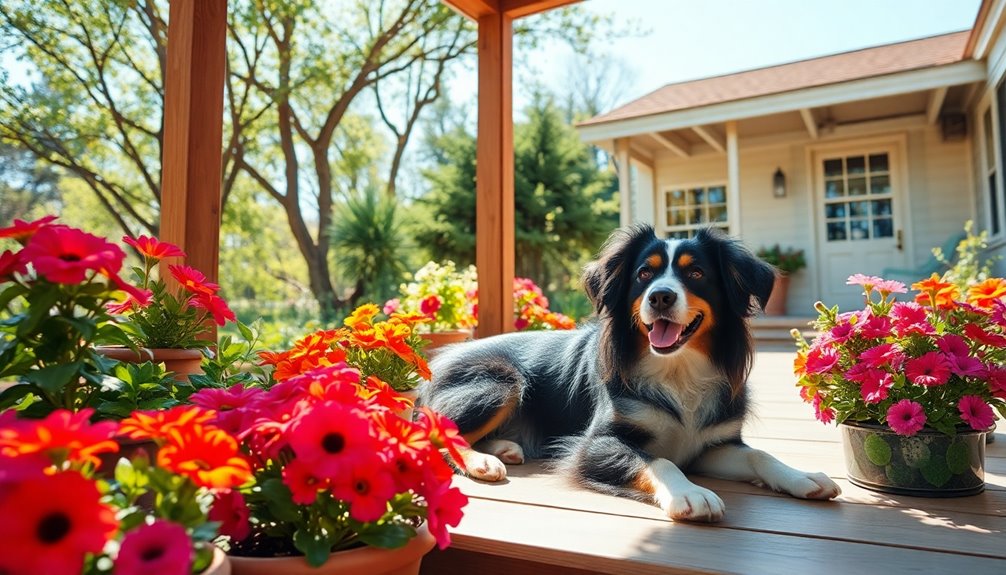
If you live in an urban apartment with a balcony, a Cockalier can thrive in your space. They adapt well to city living, as long as you provide daily exercise and mental stimulation. Plus, their moderate heat tolerance makes them suitable for various climates, as long as you keep an eye on their comfort. Their energetic and playful nature means they will enjoy regular outdoor activities as part of their exercise routine. Additionally, incorporating portable camping toilets into your camping trips will ensure convenience and comfort for both you and your Cockalier.
Urban Apartment With Balcony
Imagine sipping your morning coffee on a sun-drenched balcony, the vibrant city skyline stretching out before you. Living in an urban apartment with a balcony offers the perfect blend of convenience and comfort. These apartments are typically located in prime areas, putting schools, hospitals, shopping centers, and public transport right at your fingertips. You'll enjoy shorter commutes, saving both time and money, while the walkability of your neighborhood helps reduce your carbon footprint. Additionally, studies show that living in a pleasant environment can enhance cognitive function, making your urban lifestyle even more rewarding.
Modern amenities like swimming pools, gyms, and landscaped gardens enhance your lifestyle, providing spaces for relaxation and socialization. The contemporary designs maximize both comfort and functionality, making the most of your living space. You'll appreciate the added security measures, including CCTV cameras and gated entrances, fostering a sense of safety and community.
Moreover, living in an apartment means lower utility bills and maintenance costs. Shared facilities not only reduce expenses but also promote a sense of belonging as you connect with neighbors. Additionally, urban living often provides access to diverse restaurants, shops, and cultural venues, enriching your overall experience.
With the combination of urban convenience, modern living, and community spirit, an urban apartment with a balcony truly represents an ideal living environment for you and your Cockalier.
Moderate Tolerance for Heat
Heat management is vital for the well-being of your Cockalier, as they possess a moderate tolerance for warmer temperatures. While they can adapt to various weather conditions, they aren't specifically bred for hot climates. Their medium-length coat, whether curly or wavy, doesn't provide the same heat tolerance as shorter-haired breeds. Therefore, it's crucial to create a comfortable environment for them.
Ensure your Cockalier has access to shade and fresh water to prevent dehydration. Avoid leaving them outside for long periods on hot days, and take regular breaks during outdoor activities to monitor for signs of discomfort.
Providing a cool indoor space during extreme heat is essential, along with adjusting their routine to skip peak sun hours. Additionally, maintaining a consistent schedule of moderate exercise helps prevent overheating and keeps them healthy.
When exercising your Cockalier, plan walks and play sessions during cooler parts of the day. Shorten the duration of activities like fetch to avoid exhaustion. You can also engage them with mental stimulation indoors, using puzzle toys or obedience training.
Make sure they stay hydrated before and after exercise. With proper precautions, your Cockalier can thrive, enjoying both indoor and outdoor spaces while staying comfortable in warm weather.
Cockaliers Excel in Therapy Roles
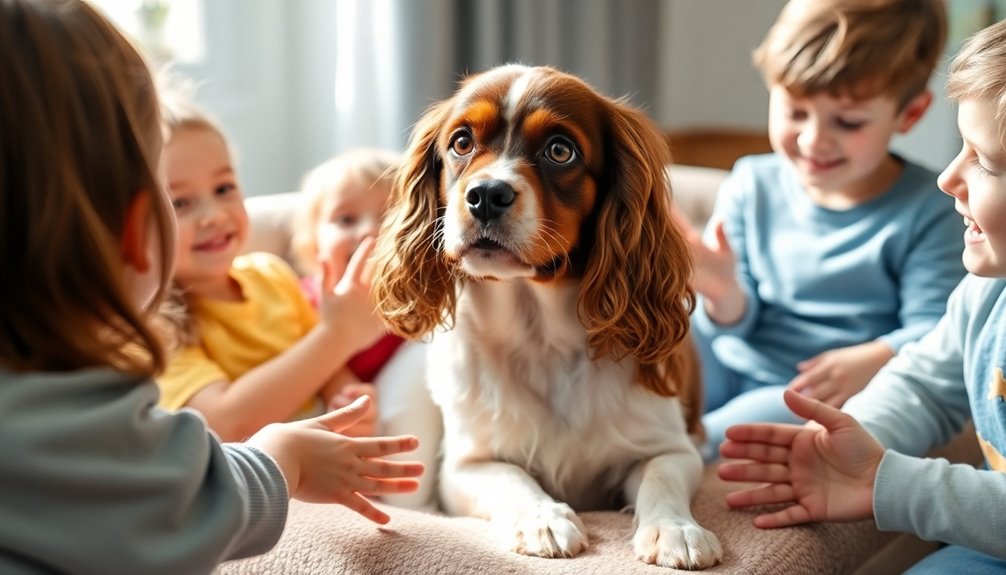
Cockaliers make fantastic therapy dogs thanks to their affectionate nature and hypoallergenic coats, which are ideal for those with allergies. Their friendly demeanor and emotional intelligence allow them to provide comfort and support to people in need. Plus, their appearance in 'The Queen's Corgi' showcases their charm and appeal, making them even more recognized in therapeutic roles. With their strong tendency to follow humans closely, Cockaliers enhance the emotional connection and support they offer in therapy settings.
Hypoallergenic Coat Characteristics
If you're considering a Cockalier for therapy work, it's important to note that while their coat isn't hypoallergenic, their affectionate nature more than makes up for it.
Their medium to long, silky coat can be curly and requires regular grooming to keep it in top shape. Depending on their genes, they may shed a moderate to heavy amount, so be prepared for some extra cleaning.
You'll need to brush your Cockalier several times a week to prevent tangling and maintain a shiny coat. Trimming may be necessary to manage the feathering around their ears, feet, chest, and tail.
Don't forget about nail trimming and ear cleaning, which are essential for overall grooming. Regular inspections can help you catch any coat-related issues early.
While they mightn't be the best choice for households with severe dog allergies due to their shedding, their friendly and loving nature makes them ideal for therapy roles.
If you're dedicated to grooming, a Cockalier can still be a wonderful addition to your family, providing comfort and companionship to those in need.
Featured in 'The Queen's Corgi
While grooming is important for maintaining a Cockalier's beautiful coat, their true strength lies in their ability to provide love and support in therapy roles.
These affectionate dogs inherit high intelligence from their Cocker Spaniel and Cavalier parents, making them quick learners who master commands with ease. Their sensitive and perceptive nature allows them to excel in therapy settings, where emotional support is vital. Additionally, assertive leadership in training helps ensure that Cockaliers thrive, as it fosters a clear understanding of boundaries and expectations. Visualization techniques can also enhance their ability to connect with those they support, allowing for deeper emotional bonds.
Cockaliers thrive in family environments, showing a natural affinity for children and being friendly towards other pets. Their social nature helps them adapt to various social situations, forming deep attachments to their owners. To ensure they develop well, regular socialization is crucial from a young age.
Additionally, Cockaliers need regular exercise to maintain their happiness and health. Daily walks, playtime, and interactive games keep them physically and mentally stimulated. Engaging in activities like fetch and tug-of-war not only strengthens your bond but also prevents boredom. Maintaining high vibrational energy during these activities can further enhance their overall well-being.
With proper training and socialization, including consistent positive reinforcement, Cockaliers can become well-rounded companions. Their unique blend of charm and affection makes them excellent therapy dogs, ready to bring comfort to those in need.
Ideal for Active Families?
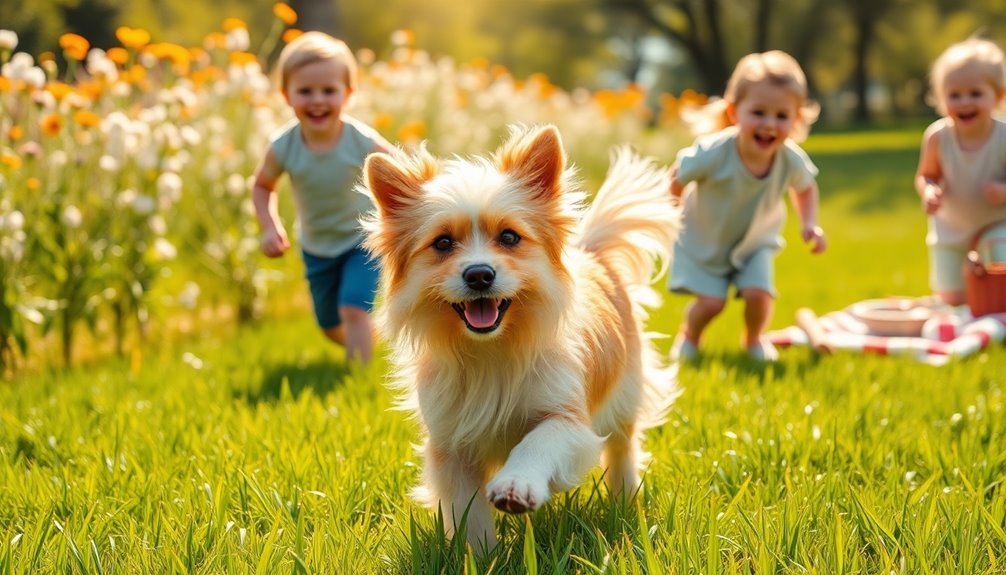
Cockaliers are great companions for active families, adapting well to various lifestyles, whether you live in an apartment or a house.
You'll need to keep up with their grooming needs, especially if they inherit a coat that sheds more.
With regular exercise and mental stimulation, these dogs thrive in environments where they can engage and bond with their family members.
Versatile for Various Lifestyles
The Cockalier is an excellent choice for active families seeking a loyal companion that can seamlessly adapt to their dynamic lifestyle.
Whether you live in a bustling apartment or a spacious house, this breed thrives in various living environments. They fit well with singles, families, and seniors alike, making them a versatile addition to any home. Additionally, their adaptable nature can be enhanced by mental stimulation, which is crucial for preventing boredom and promoting overall well-being.
With their patient and tolerant nature, Cockaliers are fantastic with children, forming strong bonds with every family member. They also socialize well with other pets when introduced properly, enriching your household even further.
Enjoying family activities and outings, they prefer to be around you rather than alone for long periods. Additionally, their moderate energy levels mean they are well-suited to a variety of exercise routines, allowing for flexibility in how you engage them.
To keep your Cockalier happy and healthy, plan for about 30-60 minutes of daily exercise, such as walks, fetch, or gentle hikes.
Their exercise needs can vary based on age and health, but mental stimulation is equally crucial. Engage them with puzzle toys or obedience training to prevent boredom.
This breed's adaptability, sociability, and exercise requirements make them an ideal companion for active families looking for a loving and engaging pet.
Grooming Needs and Maintenance
Maintaining a Cockalier's grooming needs is manageable and fits well into the routine of active families. Brush your Cockalier's medium-length coat several times a week with a slicker or pin brush to prevent matting and reduce shedding.
Don't forget to trim their nails every few weeks to keep them comfortable. Regular ear cleaning is essential to avoid infections, especially given their floppy ears. Aim to brush their teeth daily for optimal dental health.
As for coat management, you'll notice moderate shedding, which can increase during seasonal changes. Regular brushing helps keep this in check, but some Cockaliers might benefit from professional grooming, particularly if they've longer coats.
Bathe your furry friend every few months or sooner if they get dirty, using mild dog-specific shampoos. Additionally, providing a high-quality protein source in their diet can further support a healthy coat and overall well-being.
Create a positive grooming experience by introducing the routine early, using treats and praise to build trust. Be patient and consistent; establishing a regular grooming schedule not only keeps your Cockalier looking great but also strengthens your bond.
With these simple practices, your active family can enjoy the charm and affection of a well-groomed Cockalier!
Frequently Asked Questions
What Types of Activities Do Cockaliers Enjoy Most?
Cockaliers enjoy a variety of activities that keep them active and engaged.
You'll find they love daily walks and playing fetch, which helps burn off energy. Swimming is a fantastic way for them to cool off and have fun.
They thrive on mental challenges too, like puzzle games or obedience training.
Don't forget social interactions, as they adore spending time with you and meeting new friends, both human and canine!
How Do Cockaliers Interact With Other Pets?
When it comes to interacting with other pets, you'll find that proper introductions are key.
Cockaliers generally get along well with dogs, cats, and even smaller pets if socialized early. Their friendly nature helps them bond, but supervision is essential to ensure everyone gets along.
Gradually introducing them to new pets and establishing boundaries can lead to harmonious relationships, allowing you to enjoy a multi-pet household without worry.
Are Cockaliers Prone to Any Specific Behavioral Issues?
Yes, Cockaliers can be prone to specific behavioral issues, especially if they're bored or anxious.
You might notice excessive barking, digging, or chewing if they don't get enough mental and physical stimulation.
Separation anxiety can also develop if they're left alone for too long.
To prevent these problems, make sure you provide consistent training, positive reinforcement, and plenty of exercise to keep them happy and engaged.
Socialization is equally important to avoid temperament issues.
What Is the Best Diet for a Cockalier?
To ensure your dog thrives, focus on a high-quality diet rich in protein from meat sources like chicken or beef.
Include healthy fats for skin and coat health, and add small amounts of carbohydrates from vegetables.
Feed at least twice daily, adjusting portions based on their activity and weight.
Always provide fresh water and consider their life stage needs.
Regular consultations with your vet can help you fine-tune their diet for optimal health.
How Can I Identify a Reputable Cockalier Breeder?
To identify a reputable Cockalier breeder, look for transparency in breeding practices and health testing.
They should openly discuss the puppy's lineage and provide health guarantees.
Visit their facility to assess the environment and meet the puppies and their parents.
Check for positive reviews and affiliations with breed clubs.
A good breeder will prioritize socialization and offer support for your puppy's care, ensuring a well-adjusted addition to your family.
Conclusion
In conclusion, the Cockalier is truly the ultimate blend of charm and affection, making it a fantastic companion for active families and individuals alike. With their friendly temperament, adaptability, and ability to thrive in various environments, they fit seamlessly into your life. Plus, their knack for therapy roles showcases their incredible emotional support. If you're looking for a loving, energetic pet that'll bring joy to your home, the Cockalier might just be the perfect match for you!


